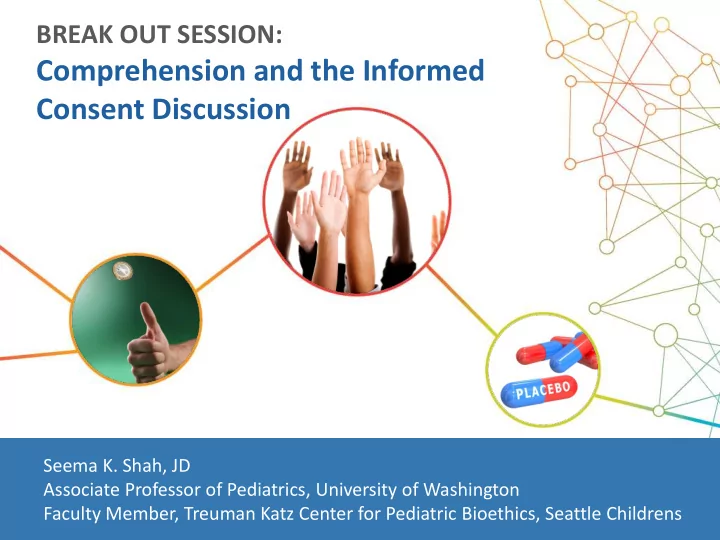

BREAK OUT SESSION: Comprehension and the Informed Consent Discussion Seema K. Shah, JD Associate Professor of Pediatrics, University of Washington Faculty Member, Treuman Katz Center for Pediatric Bioethics, Seattle Childrens
Learning Objectives I. Difficult concepts Review difficult informed consent concepts for individuals to understand II. How are we doing? Discuss how these concepts are typically presented in the informed consent conversation II. How can we do better? Work with a small group to develop, practice, and test innovative strategies to present difficult concepts from real consent forms
Understanding of f randomization How do we usually do this? Randomization is a particularly hard How well do we concept for people usually do this? to understand Can we think outside the box and do better?
How do we usually do this is? How have you seen randomization described?
How well do we usually do this is? 100% 90% 80% 70% 60% 50% Understanding of 40% randomization 30% 20% 10% 0% Uganda US IDUs, HIV Finnish women, Thai HIV tx U.S. men heart pediatric vaccine breast cancer attack malaria tx Pace et al. 2005 Hietanen 2000 Howard 1981 Harrison et al. 1995 Pace et al. 2005
Understanding of f pla lacebo 10% of Gambian mothers understood placebo design for vaccine trial Leach et al. 1999 67% of US participants in rheumatoid arthritis trial knew some people would get a placebo • 50% knew they may not get active drug • 53% knew treatment would not be decided based on symptoms Criscione et al. 2003
Doin ing better: Some strategies Clarify what Use examples Incorporate is not that are more visuals happening realistic
Doin ing better: Some strategies Study in Malawi randomized women to intervention to improve understanding (n=36) • Vignettes • Asking patients to repeat in their own words, explain to others • Neutral team to present Results: • 13/18 women in intervention arm obtained above 75% • No one in the control arm obtained this level Ndebele et al. 2012
Your turn 30-minute Optional Small groups Share back sample case sample case Get in groups of 2-3 Using sample consent If you have extra time , Each group shares their randomization test your strategy using strategy for the sample language, discuss how the next numbered language and what they to present it and how to sample randomization did with it test it language
Conclusions I. Randomization and placebo are difficult concepts to understand II. Creating strategies to better describe these strategies as part of the consent conversation promotes comprehension
Questions/consultation/discussion Any questions, consultation, or discussion from any part of the course?
Understanding of f voluntariness % who felt Study population pressure Cite ACHRE 1996 Cardiology and oncology 2% studies in US (n=570) Van Dutch parents in anticonvulsant 25% Stuijvenberg study 1998 Pace et al. Ugandan parents in malaria tx 15% from AJPH 2005 trial others; 58% from child’s illness
Case about voluntariness Abdool-Karim Q, et al. AJPH 1998
Questions What should the research team in What could explain this study have these responses? done with these findings? What does this How could you suggest about doing explain research on voluntariness informed consent in better? general?
Recommend
More recommend